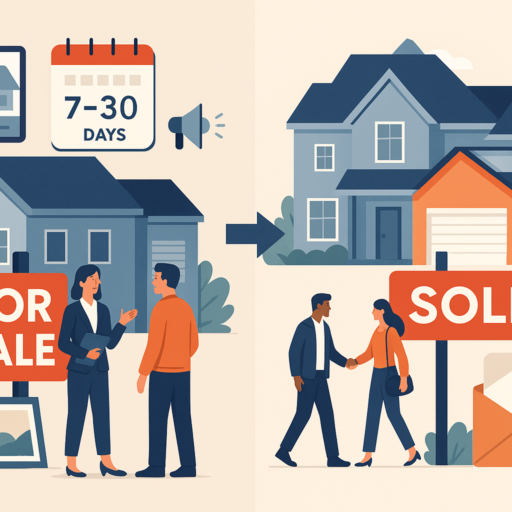Table of Contents
- 1 Why Speed Matters in Real Estate Today
- 2 Top Reasons People Need to Sell Quickly
- 3 Popular Fast-Sale Methods and How They Work
- 4
- 5 Advantages and Disadvantages of Each Approach
- 6 Insider Tips to Prepare a Home for a Quick Sale
- 7 Common Mistakes to Avoid When Selling Fast
- 8 How the Market Affects Your Timeline
- 9 When to Consider Professional Guidance
- 10 Final Thoughts
Why Speed Matters in Real Estate Today
Selling a home quickly has become increasingly essential in today’s fast-paced real estate landscape. The speed at which a home sells can shape not just the financial outcome for the seller but also the entire selling experience. Listings that close within the first month of being on the market are statistically more likely to fetch higher offers and encounter fewer negotiation hurdles. Buyers often become suspicious of listings with higher days-on-market counts, speculating that this may be the reason buyers hesitate. For many homeowners facing imminent relocations or life changes, time is truly of the essence. The process must be both efficient and stress-free. Accepting a cash offer for house is one way sellers can overcome the hurdles typically associated with drawn-out closing periods. With the right approach, sellers can avoid unexpected delays, reduce carrying costs, and focus their energy on their next chapter. Adapting to modern transaction trends can increase certainty, especially in challenging economic times.
Additionally, working with experienced real estate professionals can streamline the process and attract serious buyers faster. Digital marketing strategies, such as virtual tours and targeted online listings, have also become vital tools for speeding up home sales. Ultimately, understanding buyer behavior and staying responsive to market signals can give sellers a distinct advantage.
Top Reasons People Need to Sell Quickly
Life is unpredictable, and that unpredictability often drives the need for a rushed home sale. Some homeowners might receive a sudden job transfer across the country, while others must handle divorce, changes in family size, or critical family health issues. Many sellers also inherit homes from relatives and, rather than manage a long-distance property or deal with repairs, seek to close as efficiently as possible. Others are motivated to minimize the stress and expense of overlapping mortgage payments by taking steps to finalize a fast close. Financial circumstances can also necessitate quick action. Mounting debts, the threat of foreclosure, or a desire to cash out on the property to pay for education or other investments push some to seek direct, no-fuss selling solutions. For others, the urgency is emotional, removing the burden of showings and constant cleaning that come with traditional listings. The statistics reveal that nearly 20% of American sellers look for ways to avoid long listing times and protracted negotiations, showing the widespread desire for swifter processes.
Popular Fast-Sale Methods and How They Work
- Cash Buyers: Cash buyers play a significant role in the speed-selling space. These buyers, including real estate investors and companies, handle transactions without the need for mortgage approval or lender appraisals. As a result, deals can close in as little as seven days, and homes are often bought in “as-is” condition, meaning no need for costly or time-consuming repairs.
- For Sale By Owner (FSBO): Selling without an agent allows homeowners to interact directly with interested buyers. While FSBO can eliminate commission fees, the seller is entirely responsible for marketing, paperwork, and negotiations. It requires a hands-on approach, but for some, this autonomy can translate into both a faster and more lucrative sale.
- iBuyers: iBuyers are technology-driven companies that use proprietary algorithms to provide nearly instant cash offers on homes. Sellers input basic property details, receive offers within hours or days, and can choose a flexible closing date. iBuyers streamline the experience by handling repairs and paperwork, but they may charge service fees and offer slightly below traditional market values.
- Real Estate Agents Specializing in Fast Sales: Some agents focus exclusively on efficient transactions, leveraging vast local networks and marketing know-how. With access to pre-qualified buyers and experience in time-sensitive negotiations, these professionals can shave weeks off a typical sale timeline.
Each of these methods can be a good fit depending on the reason for a swift sale, the condition of the home, and the seller’s comfort level with risk and involvement.
Advantages and Disadvantages of Each Approach
There’s no single answer when it comes to selling fast—every path offers benefits and trade-offs. Choosing a cash buyer generally means unmatched speed and less red tape. This option is ideal for those selling inherited homes, properties with deferred maintenance, or those needing funds urgently. However, sellers should expect offers to come in lower than what an open market, competitive listing might yield. With FSBO, the biggest draw is control. Sellers set their schedule, develop personal relationships with buyers, and can potentially maximize their profits without paying listing commissions. The flip side, however, is the increased workload, complexity, and potential legal risk if one is unfamiliar with real estate contracts. iBuyers offer convenience that is hard to match—sellers can skip showings and repairs—but fees and potential deductions for home repairs reduce the final payout. Meanwhile, fast-sale agents bring their expertise, local insights, and negotiation skills to the table. While their commission is a cost, they often offset this with a quicker, less stressful process and better exposure to buyers ready to move forward quickly.
- Cash Buyers: Speedy closings, fewer contingencies, but often a lower price.
- FSBO: High profit potential and control, but more legwork and risk.
- iBuyers: Certainty and minimal effort, offset by fees and lower valuations.
- Agents: Professional marketing and fast-track expertise at the cost of a commission.
Insider Tips to Prepare a Home for a Quick Sale
- Declutter and Depersonalize: Removing excess belongings and personal items helps buyers visualize the home as their own, making it more appealing.
- Invest in Small Upgrades: Cost-effective improvements—like painting, replacing outdated hardware, or installing brighter lighting—can significantly boost perceived value and attract more buyers quickly.
- Set a Realistic Price: Analyze sales data for neighboring homes and price the property to entice buyers without leaving too much money unclaimed. Properties priced correctly often spark multiple offers, sometimes selling above asking.
- Emphasize Strengths: Use online listings and high-quality photographs to showcase standout features, boosting interest among viewers browsing online.
Research indicates that staged, well-presented homes not only sell faster but fetch higher prices. Even simple efforts like landscaping and power washing exteriors can make a sizable difference in attracting motivated buyers quickly.
Common Mistakes to Avoid When Selling Fast
- Overpricing: Even in active markets, setting an unrealistic price repels buyers, causing a listing to languish and eventually requiring price drops that may be viewed negatively.
- Neglecting Repairs: Small cosmetic issues or overlooked maintenance can suggest deeper problems, prompting buyers to look elsewhere or negotiate steep discounts.
- Not Verifying Buyer Credentials: Before signing contracts, it’s essential to obtain proof of funds from cash buyers and pre-approval letters from financed buyers. This step prevents wasted time and failed deals.
By tackling these common pitfalls before listing, sellers can prevent costly delays and ensure a more straightforward journey from offer to closing.
How the Market Affects Your Timeline
Market dynamics directly influence how rapidly a home will attract qualified offers. In a seller’s market, where buyer demand outpaces available inventory, homes routinely sell in days, often with competing bids, especially if priced well. On the other hand, a glut of listings or rising mortgage interest rates may shift the balance in favor of buyers, slowing transactions and exerting downward pressure on prices.
Seasonal fluctuations can also play a role, with spring and summer typically delivering the fastest results. Staying updated on local real estate reports, monitoring trends, and consulting with knowledgeable professionals will equip sellers to act decisively and advantageously in any market.
When to Consider Professional Guidance
Complex scenarios demand expert support. Whether it’s the legal maze of estate sales, unresolved title questions, significant repairs, or navigating the intricacies of foreclosure, experienced real estate agents or attorneys prove invaluable. Their input can help establish the right sale strategy, screen buyers, and negotiate favorable terms—often making the difference between a seamless or stressful sale.
Even seemingly straightforward sales can benefit from a professional touch, particularly for sellers unfamiliar with real estate contracts or local regulations. Connecting with advisors helps minimize risks, ensures compliance, and brings extra confidence to the negotiation table.
Final Thoughts
There are many ways to sell a house quickly, and the best approach depends on factors like timing, property condition, and personal priorities. Sellers who take time to evaluate their options—whether partnering with a seasoned real estate agent or exploring modern tech-based platforms—can achieve both speed and a satisfying result. With the proper preparation, informed decisions, and a flexible strategy, a smooth and timely sale is well within reach. By focusing on the approach that aligns with their unique situation, sellers can make a confident transition with reduced stress and greater peace of mind.


